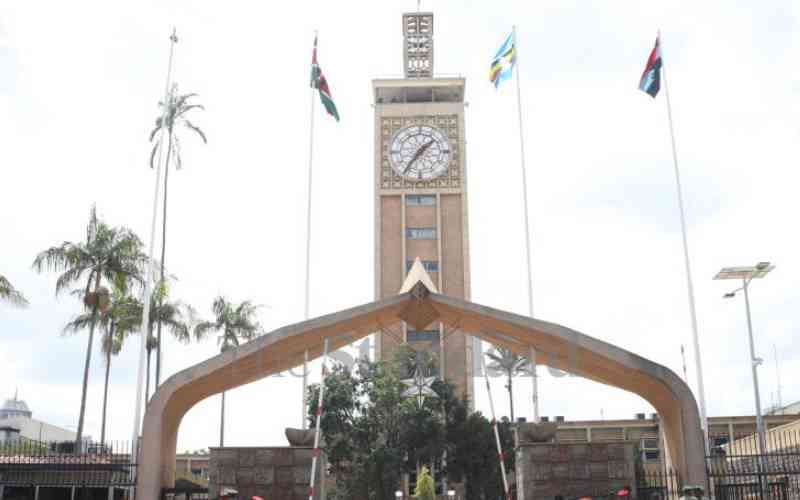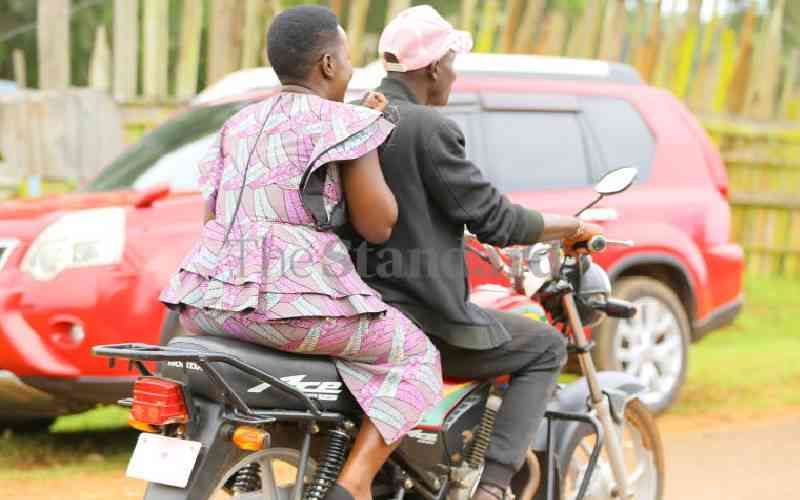 |
|
More than 11,000 motorbike drivers or passengers die every year, accounting for over 70 per cent of the country’s road fatalities. |
By DANN OKOTH
KENYA:Njuguna Njoroge twitches and turns as he hangs precariously onto his life at Kiambu District Hospital.
His broken leg dangles delicately on a suspender as blood oozes through white bandages wrapped around his head.
In the same ward, Wamaitha Kimanthi writhes in agony, his heavily plastered limb flailing in the air in an effort to ward off pain.
Kimanthi fell off his motorbike at high speed while rushing for a passenger who had telephoned from a nearby shopping centre wanting to be picked and dropped in Kiambu town. He broke his arm severely.
The two motorbike riders represent an ominous picture of a transport system that has turned into grim reaper.
Njoroge’s fate was tragic. His motorbike was hit from behind by a speeding truck on the Kiambu-Nairobi Road flinging him and his passenger at least 50 feet into the air, according to a close friend.
When they hit the ground inside a coffee plantation, his passenger, a young woman in her early 30s died instantly. Njoroge was rushed to hospital in critical condition.
Both Njoroge and Kimanthi are part of growing statistics of the boda boda carnage that claims tens of lives each day.
Boda boda transport may have helped to create jobs for many unemployed youths, who use motorbikes to earn a living, but hundreds are getting maimed and others dying as riders rush to make quick cash.
Greed and crime
According to official statistics, three out of 100 people, who are involved in boda boda accidents, lose their lives. The death rate in the industry is soaring amidst blatant disregard of traffic rules, lack of safety regulations, corruption, greed and crime.
Boda bodas now kill at least 500 people per year, according to the Traffic Police Department statistics. That accounts for 14 per cent of total number of road fatalities in the country, which stand at 3,000 per year ahead of murder, which is responsible for about 700 deaths annually.
Last year, motorbikes, which are popular with commuters in most urban and rural areas claimed lives of 430 people, according to official figures. Another 1,359 sustained serious injuries and 195 suffered slight injuries.
Out of 1,104 boda boda accidents in 2012, 415 ended in deaths, accounting for 38 per cent of the number of cases ending in fatalities. And 1,984 people suffered injuries.
Stay informed. Subscribe to our newsletter
Police blame inexperience, lack of driving school training, lack of highway code knowledge and speeding as the major causes of the accidents.
Others include overloading, carrying more passengers than prescribed by law, improper overtaking, failure to wear helmets and comply with road safety precautions and requirements.
Traffic rules
Traffic Commandant Samuel Kimaru says police have put in place measures to ensure full implementation of traffic rules to rein in on boda boda carnage.
“We now force motorbike riders to wear helmets and reflector jackets,” Kimaru says, adding “we also hold meetings with their representatives, who we encourage to sensitise their members on the importance of observing traffic rules.”
Kimaru notes the Traffic Police Department has entered in an agreement with most driving schools to include lessons for motorbike riders in their curriculum, adding that instead of the week training stint the riders take on their own, it will be mandatory that they go through a three week training course.
“Two weeks have been set aside for training, including learning the highway code while another week will be for practical training without which no one will be given licence,” he says.
But even with these measures, things aren’t looking good as statistics show that the problem can only get worse.
Strain on facilities
As at end of July, boda boda carnage had already claimed 304 lives. That is 71 per cent of the total average death toll in 2012. The number of fatal accidents involving boda bodas, at 250 accidents, is also more than half the number of all accidents last year - and we are barely past the second quarter of this year.
At 916 total accidents so far and climbing, authorities must go beyond public statements and promises for action and adopt pro-active measures to address this worrying trend.
Medics at Kenyatta National Hospital (KNH) say the causes of boda boda accidents must be addressed because they put a lot of strain on resources at health facilities.
“The accidents completely overstretch our resources,” said Simon Ithae, KNH corporate affairs manager.
The orthopedic ward at KNH is always teeming with boda boda victims as accidents escalate and people with broken limbs, shattered skulls and twisted vertebrae flock the hospital for treatment.
“The metal components needed to fix the casualties are expensive. We are also overwhelmed by the sheer numbers when it comes to theatre space and specialists to deal with injuries,” Ithae said.
Such patients are now forced to wait for weeks - even months - to have their injuries fixed at huge economic cost to the hospital, their families and the economy.
Killer gangs
In places like Kiambu hospital, special wards were instituted to deal with victims, but the cost of dealing with the deluge of cases is high, as many patients wait in line for long periods while others are sent away after a few remedial treatments.
About 35km from Kiambu town, some boda boda operators’ worries go beyond being killed in a road accident.
At 5am, James Awiti leaves his house in Kayole estate in Nairobi to start work. However, he understands that there is a possibility that he may not return home with his bike and the day’s collections either due to a road accident or an attack by a killer gang.
“Sometimes it is a matter of life and death because if you are not killed in an accident, you will encounter robbers who will steal the bike, the money and probably kill you,” says the 36-year-old father of three, who has been in the business for two years.
Lack of regulation in the sector is evident in the number of motorbikes involved in accidents and abandoned at Buru Buru Police Station.
According to a senior traffic police officer at the station, most bikes impounded have no documents, adding that their owners are reluctant to come forward and claim them for fear of being arrested.
“It is this scenario that fuels crime in the sector because not a single motorbike can be traced giving thugs leeway to use them to commit crimes,” he says.
Court redress
Lack of documentation and insurance means that riders and passengers are unable to lodge cases for compensation in court when involved in road accidents. “Drivers of a commuter bus company have killed tens of boda boda riders on the Donholm-Kayole route and walked away scot-free because they know we cannot get court redress,” says Charles Momanyi, a boda boda rider who works the Jacaranda and Donholm route. “I have escaped death five times at the hands of matatu drivers. In the last one, I broke my rib when I was swept off the road by a bus,” he says.
 The Standard Group Plc is a
multi-media organization with investments in media platforms spanning newspaper
print operations, television, radio broadcasting, digital and online services. The
Standard Group is recognized as a leading multi-media house in Kenya with a key
influence in matters of national and international interest.
The Standard Group Plc is a
multi-media organization with investments in media platforms spanning newspaper
print operations, television, radio broadcasting, digital and online services. The
Standard Group is recognized as a leading multi-media house in Kenya with a key
influence in matters of national and international interest.
 The Standard Group Plc is a
multi-media organization with investments in media platforms spanning newspaper
print operations, television, radio broadcasting, digital and online services. The
Standard Group is recognized as a leading multi-media house in Kenya with a key
influence in matters of national and international interest.
The Standard Group Plc is a
multi-media organization with investments in media platforms spanning newspaper
print operations, television, radio broadcasting, digital and online services. The
Standard Group is recognized as a leading multi-media house in Kenya with a key
influence in matters of national and international interest.









